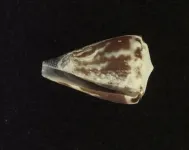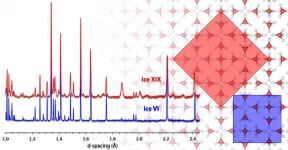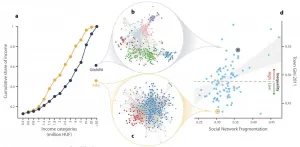(Press-News.org) PHOENIX, Ariz. and DUARTE, Calif. -- Feb. 17, 2021 -- Urinalysis has long been a staple of physical exams to detect and manage a number of diseases and disorders, but not cancer. What if it were that easy, though, and cancer was detected in its very earliest stages when the disease responds more favorably to treatment and improved outcomes are more likely?
That was the question posed by scientists at the Translational Genomics Research Institute (TGen), an affiliate of City of Hope, who have found a way of zeroing in on early-stage cancer by analyzing short strands of cell-free DNA in urine. Their study's findings were published today in the scientific journal Science Translational Medicine.
Previous thought once held that DNA fragments in urine were degraded at random and were too short to provide any meaningful information about a disease as complex as cancer. TGen and City of Hope researchers and their colleagues from Baylor University and Phoenix Children's Hospital found that these DNA fragments are not random at all, and can clearly indicate a difference between healthy individuals and those with cancer.
"There are many steps between where we are now and where we want to go -- detecting cancer from a urine sample -- but without doubt this is an encouraging first step," said Muhammed Murtaza, M.B.B.S., Ph.D., an Associate Professor and Co-Director of TGen's Center for Noninvasive Diagnostics, and the study's senior author.
Dr. Murtaza previously led a team of TGen scientists who pioneered the use of circulating tumor DNA in blood, using genetic fragments to detect cancer with a simple blood draw. This "liquid biopsy" method sidesteps the need for many surgical biopsies of suspected tumors, and means that physicians can monitor cancer in their patients more frequently given the less invasive nature of the procedure.
Collecting a urine sample reduces the physical invasiveness to zero, Dr. Murtaza explained, and may eliminate a lab visit, given that the sample could be collected at home and mailed in for analysis.
By studying tissue samples from children with various cancers, whose malignancies often move extraordinarily fast, and adults with pancreatic cancer, whose early detection is critical to their disease outcomes, researchers mapped the DNA fragmentation profiles in their urine.
"We found that certain regions of the genome are protected from fragmentation in urine from healthy individuals, but the same regions are more fragmented in patients with cancer," Dr. Murtaza said.
The fragmentation profiles were remarkably similar across multiple individuals; the length of the DNA fragments were similar, the regions of the genome where the fragmentation occurred were consistent, and informed researchers what type of cells contributed the fragments.
Ajay Goel, Ph.D., chair of the Department of Molecular Diagnostics and Experimental Therapeutics and Associate Director for Basic Science at City of Hope, a world-renowned independent research and treatment center for cancer and diabetes, is one of the study's authors. He is a leading expert in developing early-detection blood tests for colon, pancreatic and ovarian cancers.
"If the study results come to fruition, our urinalysis technology would be a remarkable breakthrough in the detection of many cancers, especially in pancreatic cancer," Dr. Goel said. "If cancer is detected early, it could substantially lower the mortality rate for what is currently the third leading cause of cancer death in the U.S."
While early results are promising, the researchers indicate the need to test their findings in much larger populations of cancer patients and identify differences between men and women, young and old, and those with co-morbidities, such as diabetes and other chronic diseases.
"This is a fundamental new finding and provides a potentially dynamic path forward for the early diagnosis of cancer, given that urine is one of the easiest samples to collect," said Daniel D. Von Hoff, M.D., TGen Distinguished Professor and one of the paper's authors. "If follow-on studies yield positive results, I could one day see this test becoming an integral part of one's annual physical."
INFORMATION:
Support for this study -- Analysis of recurrently protected genomic regions in cell-free DNA found in urine -- was provided by the Ben and Catherine Ivy Foundation, the National Cancer Institute, Science Foundation Arizona, Arizona Women's Board, and the Baylor Scott and White Research Institute.
NOTE: See a short video that helps explain the technology behind TGen's urine cancer test at: https://youtu.be/69zwqn91BnM
About TGen, an affiliate of City of Hope
Translational Genomics Research Institute (TGen) is a Phoenix, Arizona-based nonprofit organization dedicated to conducting groundbreaking research with life-changing results. TGen is affiliated with City of Hope, a world-renowned independent research and treatment center for cancer, diabetes and other life-threatening diseases: CityofHope.org. This precision medicine affiliation enables both institutes to complement each other in research and patient care, with City of Hope providing a significant clinical setting to advance scientific discoveries made by TGen. TGen is focused on helping patients with neurological disorders, cancer, diabetes and infectious diseases through cutting-edge translational research (the process of rapidly moving research toward patient benefit). TGen physicians and scientists work to unravel the genetic components of both common and complex rare diseases in adults and children. Working with collaborators in the scientific and medical communities worldwide, TGen makes a substantial contribution to help our patients through efficiency and effectiveness of the translational process. For more information, visit: tgen.org. Follow TGen on Facebook, LinkedIn and Twitter @TGen.
About City of Hope
City of Hope is an independent biomedical research and treatment center for cancer, diabetes and other life-threatening diseases. Founded in 1913, City of Hope is a leader in bone marrow transplantation and immunotherapy such as CAR T cell therapy. City of Hope's translational research and personalized treatment protocols advance care throughout the world. Human synthetic insulin, monoclonal antibodies and numerous breakthrough cancer drugs are based on technology developed at the institution. AccessHopeTM, a wholly owned subsidiary, was launched in 2019 and is dedicated to serving employers and their health care partners by providing access to City of Hope's exceptional cancer expertise. A National Cancer Institute-designated comprehensive cancer center and a founding member of the National Comprehensive Cancer Network, City of Hope is ranked among the nation's "Best Hospitals" in cancer by U.S. News & World Report. Its main campus is located near Los Angeles, with additional locations throughout Southern California and in Arizona. For more information about City of Hope, follow us on Facebook, Twitter, YouTube or Instagram.
Media Contact:
Steve Yozwiak
TGen Senior Science Writer
602-343-8704
syozwiak@tgen.org
Zen Vuong
City of Hope Media Relations
800-888-5323
media@coh.org
Severe forms of malaria such as Plasmodium falciparum may be deadly even after treatment with current parasite-killing drugs. This is due to persistent cyto-adhesion of infected erythrocytes even though existing parasites within the red blood cells are dead. As vaccines for malaria have proved less than moderately effective, and to treat these severe cases of P. falciparum malaria, new avenues are urgently needed. Latest estimates indicate that more than 500 million cases of malaria and more than 400,000 deaths are reported worldwide each year. Anti-adhesion drugs may hold the key to significantly improving survival rates.
Using venom from the Conus nux, a species of sea snail, a first-of-its-kind study ...
Extending the symptoms that trigger a PCR test for COVID-19 could help detect around a third more cases of the disease.
New research led by researchers at King's College London and published in the Journal of Infection suggests that restricting testing to the 'classic triad' of cough, fever and loss of smell which is required for eligibility for a PCR test through the NHS may have missed cases. Extending the list to include fatigue, sore throat, headache and diarrhoea would have detected 96% of symptomatic cases.
A team of researchers at King's College London and the Coalition for Epidemic Preparedness Innovations (CEPI) analysed data from more than 122,000 UK adult users of the ZOE COVID Symptom Study app. These users reported experiencing ...
A research team from the Institut national de la recherche scientifique (INRS) has improved the protective effect of a molecule against ischemic stroke, which is caused by an interruption of blood flow to the brain. The results of the study, conducted in collaboration with a Spanish team, were published in the Communications Biology of Nature Research journal.
Every year in Quebec, about 20,000 people have a stroke. Also known as a "cerebral infarction", this sudden neurological deficit can lead to psychological and physical after-effects. These effects result from an increase in glutamate in the brain, which destroys neurons. "Glutamate is an essential neurotransmitter for neuronal communication, learning and memory ...
BURNABY, BC - (February 18, 2021) -- D-Wave Systems Inc., the leader in quantum computing systems, software, and services, today published a milestone study in collaboration with scientists at Google, demonstrating a computational performance advantage, increasing with both simulation size and problem hardness, to over 3 million times that of corresponding classical methods. Notably, this work was achieved on a practical application with real-world implications, simulating the topological phenomena behind the 2016 Nobel Prize in Physics. This performance advantage, exhibited in a complex quantum simulation of materials, is a meaningful step in the journey toward applications advantage in quantum computing.
The work by scientists at D-Wave ...
Ice is a very versatile material. In snowflakes or ice cubes, the oxygen atoms are arranged hexagonally. This ice form is called ice one (ice I). "Strictly speaking, however, these are not actually perfect crystals, but disordered systems in which the water molecules are randomly oriented in different spatial directions," explains Thomas Loerting from the Institute of Physical Chemistry at the University of Innsbruck, Austria. Including ice I, 18 crystalline forms of ice were known so far, which differ in the arrangement of their atoms. The different types of ice, known as polymorphs, form depending on pressure and temperature and have very different properties. For example, their melting points differ by several ...
DALLAS - Feb. 18, 2021 - Inhalation of depleted uranium from exploding munitions did not lead to Gulf War illness (GWI) in veterans deployed in the 1991 Persian Gulf War, a new study co-authored by a leading researcher of the disease at UT Southwestern suggests. The findings, published today in Scientific Reports, help eliminate a long-suspected cause of GWI that has attracted international concern for three decades.
Using high-precision multicollector mass spectrometry for the first time in such a study, END ...
[Vienna, Feb 18, 2021] Communities worldwide are trying to address inequality. One promising approach could be to look at the design of a city, according to research with real-world data in the journal Nature Communications.
An international team of scientists, including members of the Complexity Science Hub Vienna (CSH), show that urban planning directly influences the formation of social networks in a city and subsequently the socio-economic equality or inequality of its citizens.
"We know how important social networks are for our social and economic outcomes," explains CSH researcher Johannes Wachs, one of the authors of the paper. Social relations provide individuals with essential access to resources, information, economic opportunities and other forms ...
An irregular sleep schedule can increase a person's risk of depression over the long term as much as getting fewer hours of sleep overall, or staying up late most nights, a new study suggests.
Even when it comes to just their mood the next day, people whose waking time varies from day to day may find themselves in as much of a foul mood as those who stayed up extra late the night before, or got up extra early that morning, the study shows.
The study, conducted by a team from Michigan Medicine, the University of Michigan's academic medical center, uses data from direct measurements of the sleep and mood of more than 2,100 early-career ...
Researchers have published new insights into the causes of mortality in sepsis
Loss of endothelial function is induced through two different pathophysiological processes and is a major driver of septic shock, a life-threatening drop in blood pressure
The first pathway originates in the loss of the endothelial barrier triggering an increased production of the repair hormone bioactive Adrenomedullin (bio-ADM), which also has the undesired side effect of vasodilation
The second threat acting on the endothelial function is the release of the protease DPP3 into the bloodstream which degrades angiotensin II, a process resulting in decreased vascular tone and cardiac output
The different ...
The UK's first national lockdown from March 2020 and its immediate aftermath saw a massive shift in consumer habits that was initially mandated but then lingered as shops and restaurants opened but risks from the virus remained.
A new study from the universities of Cambridge and Newcastle used data from the ONS to compare retail, hospitality and online sales in the UK between March and August 2020 with average figures for the same months for the years 2010-2019.
Researchers took an approach normally used to estimate cumulative excess deaths to try and measure the impact of the COVID-19 shock on sales of UK retailers and restaurants.
They say their economic models suggest that shops predominantly selling food, such as supermarkets, saw ...




